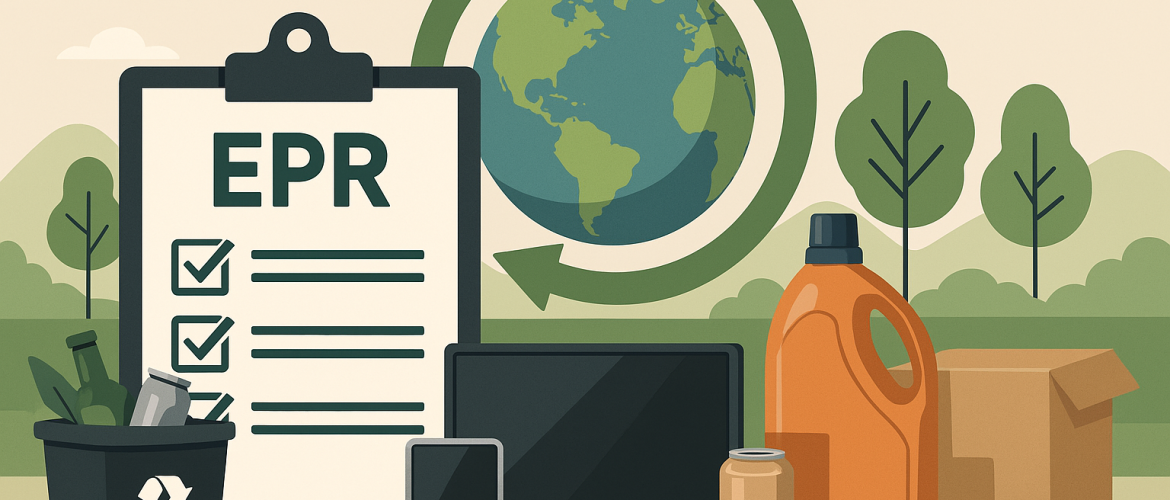How Extended Producer Responsibility (EPR) Helps Fight Climate Change and Promote Circular Economy
As global efforts intensify to combat climate change, policy tools that promote sustainability are gaining traction. One such impactful strategy is Extended Producer Responsibility (EPR)—a system that places the responsibility of post-consumer waste management on producers. But how effective is EPR in addressing the climate crisis?
This article explores how EPR reduces carbon emissions, promotes sustainable innovation, and supports the transition to a circular economy.
What is Extended Producer Responsibility (EPR)?
EPR is a policy approach where producers are made responsible for the lifecycle of their products, especially post-consumption. Instead of local governments shouldering the cost and burden of waste management, manufacturers handle product recycling, reuse, or disposal.
EPR policies:
- Encourage eco-design and sustainable manufacturing
- Support robust recycling infrastructure
- Reduce landfill use and environmental pollution
How EPR Supports Climate Change Mitigation
1. Reducing Methane from Landfills
Landfills, especially those filled with organic and plastic waste, emit methane, a potent greenhouse gas. EPR policies help by:
- Diverting organic waste toward composting or anaerobic digestion
- Increasing plastic and packaging recycling
- Lowering landfill dependency
2. Cutting CO₂ Emissions via Recycling
Manufacturing from virgin materials consumes significant energy and emits CO₂. EPR promotes:
- Greater use of recycled raw materials
- Energy-efficient production practices
- Reduction in waste incineration and dumping
Example: Recycling aluminium saves up to 95% energy compared to production from bauxite.
3. Promoting Sustainable Product Design
EPR encourages eco-innovation through eco-modulated fees, rewarding manufacturers for:
- Using recyclable and biodegradable materials
- Minimising hazardous substances
- Designing durable and reusable products
This reduces the product’s lifecycle carbon footprint.
4. Supporting the Circular Economy
By pushing for reuse, repair, and remanufacturing, EPR systems move us toward a circular economy, reducing:
- Dependence on virgin resources
- Emissions from resource extraction
- Waste generation across supply chains
EPR Success Stories Around the World
European Union
The EU Packaging Waste Directive pushed recycling rates above 65%, with France alone avoiding 2.1 million tonnes of CO₂-equivalent emissions through packaging recycling.
South Korea
EPR policies for packaging led to a 70% increase in recycling rates and helped cut methane and CO₂ emissions.
India
India’s Plastic Waste Management Rules and End-of-Life Vehicle (ELV) regulations are improving traceability and supporting national Net Zero goals through EPR.
Corporate Benefits of EPR in Climate Strategy
EPR is more than compliance—it’s a climate-smart business strategy. Companies benefit by:
- Lowering Scope 3 emissions
- Meeting ESG goals and gaining green financing
- Enhancing supply chain transparency
- Minimising repetitional and regulatory risks
Challenges and Solutions in EPR Implementation
Challenges:
- Inadequate recycling infrastructure
- Cost burdens for SMEs
- Inconsistent enforcement and free-riding
Solutions:
- Digital traceability for waste tracking
- Public-private partnerships
- Harmonised global EPR standards
Final Thoughts: Is EPR Effective Against Climate Change?
Absolutely. Extended Producer Responsibility is a vital policy tool for achieving climate targets. It reduces emissions, fosters innovation, and strengthens the circular economy.
To realise its full climate potential, stakeholders must:
- Expand recycling and waste collection infrastructure
- Enforce EPR compliance effectively
- Align policies with long-term climate action goals
References
- OECD (2001). Extended Producer Responsibility: A Guidance Manual for Governments
- IPCC (2021). Sixth Assessment Report – Working Group I
- EPA (n.d.). Sustainable Management of Materials: Aluminium
- European Commission (2021). Extended Producer Responsibility
- Ministry of Environment, Forest and Climate Change, India (2022)
- Korean Ministry of Environment (2019)
- Citeo & ADEME Reports (2023)
- Plastics for Change (2023)



